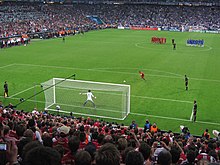
Back ركلات جزاء ترجيحية (كرة القدم) Arabic تيرات الترجيح (كورة) ARY Матчтан һуңғы пенальти Bashkir Dus-dusan (bola tendang) BEW পেনাল্টি শুট-আউট (ফুটবল) Bengali/Bangla لێدانەکانی یەکلاکەرەوە (تۆپی پێ) CKB Penaltový rozstřel Czech Ciciau o'r smotyn Welsh Straffesparkskonkurrence Danish Elfmeterschießen German

In association football, a penalty shoot-out (previously known as kicks from the penalty mark) is a tie-breaking method to determine which team is awarded victory in a match that cannot end in a draw, when the score is tied after the normal time as well as extra time (if used) has expired (for example, in a FIFA World Cup, penalties are used in elimination matches; the round of 16, the quarter-finals, the semi-finals, and the final). In a penalty shoot-out, each team takes turns shooting at goal from the penalty mark, with the goal defended only by the opposing team's goalkeeper. Each team has five shots which must be taken by different players; the team that makes more successful kicks is declared the victor. Shoot-outs finish as soon as one team has an insurmountable lead. If scores are level after five pairs of shots, the shootout progresses into additional "sudden-death" rounds.[1] Balls successfully kicked into the goal during a shoot-out do not count as goals for the individual kickers or the team, and are tallied separately from the goals scored during normal play (including extra time, if any). Although the procedure for each individual kick in the shoot-out resembles that of a penalty kick, there are some differences. Most notably, neither the kicker nor any player other than the goalkeeper may play the ball again once it has been kicked.
The penalty shoot-out is one of the three methods of breaking a draw that are approved by the Laws of the Game; the others are extra time and, for two-legged ties, the away goals rule.[1] A shoot-out is usually used only after one or more of the other methods fail to produce a winner. The method of breaking a draw for a specific match is determined beforehand by the match organising body. In most professional level competitions, two 15-minute extra time periods are played if the score is tied at the end of regulation time, and a shoot-out is held if the score is still tied after the extra time periods.
Although widely employed in football since the 1970s, penalty shoot-outs have been criticised by many followers of the game, due primarily to their perceived reliance on luck rather than skill and their dependence on individual duels between opposing players, which is arguably not in keeping with football as a team sport.[2] However, some believe the pressure and unpredictability involved makes it one of the most thrilling finales to any sport.[3][4]
- ^ a b "Laws of the Game17_Digital_Eng.pdf" (PDF). IFAB. Archived (PDF) from the original on 11 September 2016. Retrieved 27 January 2017.
- ^ Wilson, M; Wood, G; Jordet, G. "The BASES Expert Statement on the Psychological Preparation for Football Penalty Shootouts" (PDF). British Association of Sports and Exercise Sciences. Archived from the original (PDF) on 6 January 2016. Retrieved 28 January 2015.
- ^ "World Cup shootouts are great and here is how other sports can adopt the thrilling finale". USA Today. 1 July 2018. Retrieved 2 July 2018.
But all those things combine to make it dramatic and compulsive viewing, the ultimate element of instant unpredictability, a quick fix for both the "short attention span" generation and all the ones before it, too. Shootouts provide all the things we like about sports. Heroes stepping into the spotlight with a single moment of brilliant or fortune. Sympathetic figures who your heart bleeds for.
- ^ "Goalmouth Scramble: 10 'important' thoughts on the World Cup". New Zealand Herald. 2 July 2017.
Nothing beats penalty shootouts for drama. And how great was the camera pivot to capture Manchester United legend Peter Schmeichel's reactions every time his son Kasper saved a penalty for Denmark? Truly gripping theatre.